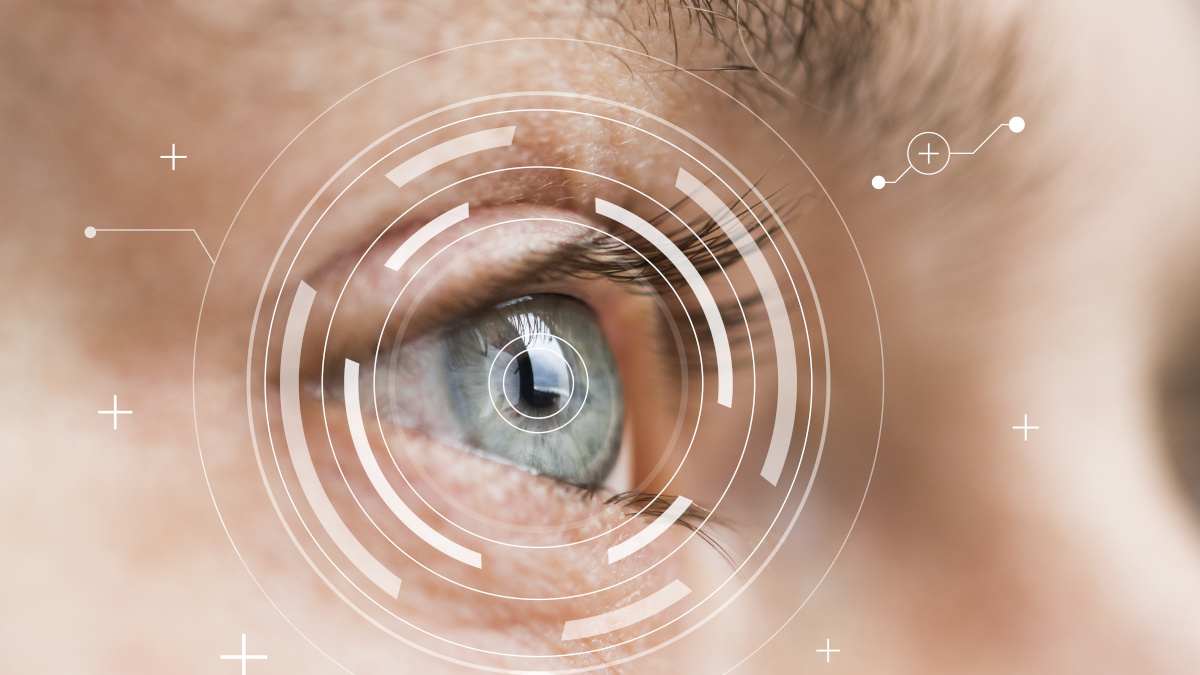
What’s the best dietary supplement for your eyes?
Do you know which dietary supplement is most effective at supporting healthy vision? This article will give you a clearer view ...`
Recap: daily care of your eyes
28,000 blinks a day, 6 eye movement muscles, perception of 2 million colours: our eyes accomplish extraordinary feats to enable us to view our environment in detail. So they deserve our full attention!
To protect these precious windows on the world, try to adopt these helpful tips on a daily basis:
- carry out any visual activities (reading, writing, sewing …) in a well-lit space to prevent ocular fatigue (1);
- take regular breaks if you work in front of a screen by following the 20-7-20 rule: every 20 minutes, concentrate on an object that’s 7 metres away from you for 20 seconds (2);
- get enough rest, with at least 7-8 hours of sleep a night (3);
- for those who wear make-up, cleanse your eyes properly every night to prevent irritation;
- when outdoors, wear sunglasses suitable for the ambient light: category 4 sunglasses offer maximum protection (though they’re not permitted for driving);
- wear the glasses or lenses prescribed for you for optimal visual comfort;
- even if you have no problems with your eyesight, have an eye test every two or three years in order to detect any silent diseases at the earliest stage (AMD, cataracts, glaucoma…)
The best substances for maintaining healthy vision
Vitamin A and the retina
A fat-soluble vitamin, vitamin A plays a crucial role in many biological functions. Amongst others, it is involved in metabolising iron, and in maintaining normal immune function and healthy skin (4-6).
However, it was in the retina that vitamin A was first isolated! As you know, the retina is the innermost membrane lining the eyeball. It is responsible for converting light signals into electrical impulses transmitted to the central nervous system which then translates them into images. To do this, the retina is equipped with two types of photoreceptor: rods and cones. The rods, which work in low light, ensure monochrome vision in darkness. The cones are responsible for our perception of colour when light levels are higher.
Vitamin A helps to maintain normal vision by participating in the production of rhodopsin (visual purple) (7). This reddish-purple pigment absorbs light in the retina’s rods, and is thus much in demand when the eyes need to adapt to darkness. Vitamin A also plays a role in maintaining ‘mucous membranes’, including the conjunctiva covering the delicate cornea (8).
The body cannot produce vitamin A and it therefore needs to be provided by the diet, in two main ways: either through direct intake of preformed vitamin A from animal-source products (retinol), or through consumption of plant-source foods rich in carotenoids (beta-carotene).
Bilberries, ‘berry’ good for the eyes
The realisation that bilberries (Vaccinium myrtillus) offered benefits for the ‘windows to the soul’ dates back a long way. As far back as the Middle Ages, the visionary healer Hildegarde de Bingen had already identified them as an invaluable aid for failing eyesight. Much later, this blue-black berry became very popular with British fighter pilots in the Second World War for helping to maintain their visual acuity on night flights.
Since then, this member of the Ericaceae family has continued to interest scientists, in particular, for its high content of anthocyanins, the pigments that give the bilberry its dark colour. It appears that bilberries help to maintain eye health and visual function through antioxidant action and venous support (9-11).
Amongst others, they play a role in stabilising the formation of collagen in the eyes, a key substance for the cohesion and protection of eye tissue. In addition, they support the health of veins and capillaries which supply the optical nerve and corneal limbus, ensuring an adequate supply of oxygen and nutrients.
What is the best supplement for the eyes?
As you can see, a supplement that’s good for the eyes needs to feature retinol and bilberry in its composition.
The perfect synergistic formulation would also include carotenoids (astaxanthin, zeaxanthin, lutein) and other promising compounds (such as anthocyanosides, anthocyanins, polyphenols or quercetin) (12).
Which is precisely the case with the supplement OptiVision which contains a total of 15 exceptional compounds, with the emphasis on natural ingredients: retinol and bilberry extract of course, but also carotenoids, glutathione, extract of grape seed, marigold, Schisandra berries ...
Additional supplements for tip-top vision
There are other substances that can also help you take care of your eyes.
Highly present in the retina, DHA helps to maintain healthy vision (13-14). It’s therefore well worth considering supplementing with this particular omega-3 fatty acid (try, for example, the product Super DHA, an environmentally-friendly formulation of DHA and EPA obtained from sustainable fishing).
Another of Nature’s important resources is maritime pine bark (Pinus pinaster) which helps to maintain eye health specifically by supporting vascularisation (15). To obtain its benefits, try a targeted eye health supplement (such as Eye Pressure Control, a formulation enriched with bilberry and vitamin E).
It’s always a good idea - not just for your eyes but for your overall health - to fight against the oxidation processes that speed up cellular ageing, by eating a diet high in antioxidant-rich, highly-coloured fruits and vegetables (16). If you want to boost your intake, try a super-comprehensive supplement (such as AntiOxidant Synergy, a really powerful formulation that includes turmeric, grape seed and resveratrol).
References
- Lin KH, Su CC, Chen YY, Chu PC. The Effects of Lighting Problems on Eye Symptoms among Cleanroom Microscope Workers. Int J Environ Res Public Health. 2019;16(1):101. Published 2019 Jan 1. doi:10.3390/ijerph16010101
- Sheppard AL, Wolffsohn JS. Digital eye strain : prevalence, measurement and amelioration. BMJ Open Ophthalmol. 2018;3(1):e000146. Published 2018 Apr 16. doi:10.1136/bmjophth-2018-000146
- Waller EA, Bendel RE, Kaplan J. Sleep disorders and the eye. Mayo Clin Proc. 2008 Nov;83(11):1251-61. doi: 10.4065/83.11.1251. PMID: 18990324.
- da Cunha MSB, Campos Hankins NA, Arruda SF. Effect of vitamin A supplementation on iron status in humans : A systematic review and meta-analysis. Crit Rev Food Sci Nutr. 2019;59(11):1767-1781. doi: 10.1080/10408398.2018.1427552. Epub 2018 Feb 5. PMID: 29336593.
- Huang Z, Liu Y, Qi G, Brand D, Zheng SG. Role of Vitamin A in the Immune System. J Clin Med. 2018;7(9):258. Published 2018 Sep 6. doi:10.3390/jcm7090258
- Kafi R, Kwak HS, Schumacher WE, Cho S, Hanft VN, Hamilton TA, King AL, Neal JD, Varani J, Fisher GJ, Voorhees JJ, Kang S. Improvement of naturally aged skin with vitamin A (retinol). Arch Dermatol. 2007 May;143(5):606-12. doi: 10.1001/archderm.143.5.606. PMID: 17515510.
- Miyazono S, Isayama T, Delori FC, Makino CL. Vitamin A activates rhodopsin and sensitizes it to ultraviolet light. Vis Neurosci. 2011;28(6):485-497. doi:10.1017/S0952523811000423
- Sadowski B, Rohrbach JM, Steuhl KP, Weidle EG, Castrillón-Oberndorfer WL. Hornhautmanifestationen bei Vitamin-A-Mangel [Corneal manifestations in Vitamin A deficiency]. Klin Monbl Augenheilkd. 1994 Aug;205(2):76-85. German. doi: 10.1055/s-2008-1045496. PMID: 7967410.
- Riva A, Togni S, Franceschi F, Kawada S, Inaba Y, Eggenhoffner R, Giacomelli L. The effect of a natural, standardized bilberry extract (Mirtoselect®) in dry eye: a randomized, double blinded, placebo-controlled trial. Eur Rev Med Pharmacol Sci. 2017 May;21(10):2518-2525. PMID: 28617532.
- Ozawa Y, Kawashima M, Inoue S, Inagaki E, Suzuki A, Ooe E, Kobayashi S, Tsubota K. Bilberry extract supplementation for preventing eye fatigue in video display terminal workers. J Nutr Health Aging. 2015 May;19(5):548-54. doi: 10.1007/s12603-014-0573-6. PMID: 25923485.
- Nomi Y, Iwasaki-Kurashige K, Matsumoto H. Therapeutic Effects of Anthocyanins for Vision and Eye Health. Molecules. 2019;24(18):3311. Published 2019 Sep 11. doi:10.3390/molecules24183311
- Johra FT, Bepari AK, Bristy AT, Reza HM. A Mechanistic Review of β-Carotene, Lutein, and Zeaxanthin in Eye Health and Disease. Antioxidants (Basel). 2020;9(11):1046. Published 2020 Oct 26. doi:10.3390/antiox9111046
- Cortina MS, Bazan HE. Docosahexaenoic acid, protectins and dry eye. Curr Opin Clin Nutr Metab Care. 2011;14(2):132-137. doi:10.1097/MCO.0b013e328342bb1a
- Querques G, Forte R, Souied EH. Retina and omega-3. J Nutr Metab. 2011;2011:748361. doi:10.1155/2011/748361
- Schönlau F, Rohdewald P. Pycnogenol for diabetic retinopathy. A review. Int Ophthalmol. 2001;24(3):161-71. doi: 10.1023/a:1 021 160 924 583. PMID: 12498513.
- Chiu CJ, Taylor A. Nutritional antioxidants and age-related cataract and maculopathy. Exp Eye Res. 2007 Feb;84(2):229-45. doi: 10.1016/j.exer.2006.05.015. Epub 2006 Jul 31. PMID: 16879819.
Keywords
3
Keep up the good work.
Im always happy when i buy my supplements from supersmart. They are efficient, fast to send out the purchase and fast to answer queries. Their site is also straight forward and easy to use.
ABDULQADER Jehad
5 Days
Great
The efficient delivery.
CLA VOETS
11 Days
Great service
Great service items dispatched straight away and arrived on time
M***** G***
15 Days
A good webshop for supplements
A good webshop for supplements, it has a large selection of them and considering the quality, the pricing offers good value for money. The ordering process is easy and the products are sent straight away.
Maurice
16 Days
Great quality
Products are of great quality and fast delivered.
Fred Laan
18 Days
SuperSmart destaca por la calidad de…
SuperSmart destaca por la calidad de sus productos.
GONZALEZ PALACIN Luis
19 Days
snelle levering,perfect product.
snelle levering,perfect product.
robert
19 Days
Been a customer for over 15 years and…
Been a customer for over 15 years and find their products along with the service excellent. I recommend Super Smart to all my friends.
Del Chandler
20 Days
Excellent product and service
The product was excellent and so were the delivery and the service
F. Ferlitz
22 Days
Never an issue ordering
Never an issue ordering. Simple and to the point. And product always comes the following day. Quality is great too!
Andrea
23 Days
Excellente service & products with rare…
Excellente service & products with rare revelation supplements I love ❤️
Giovanna Escalera
24 Days
Fast shipping
Fast shipping, products as ordered!
Coindozer
24 Days
The item arrived on time and is what…
The item arrived on time and is what was stated in the order.
HARDY Chris
27 Days
Very good products
Very good products. Very reliable. Quick delivery.
MIFSUD Joseph
31 Days
Fast shipping
Fast shipping, good products (just shipping costs to my country are extremely high).
Tanja Matko



